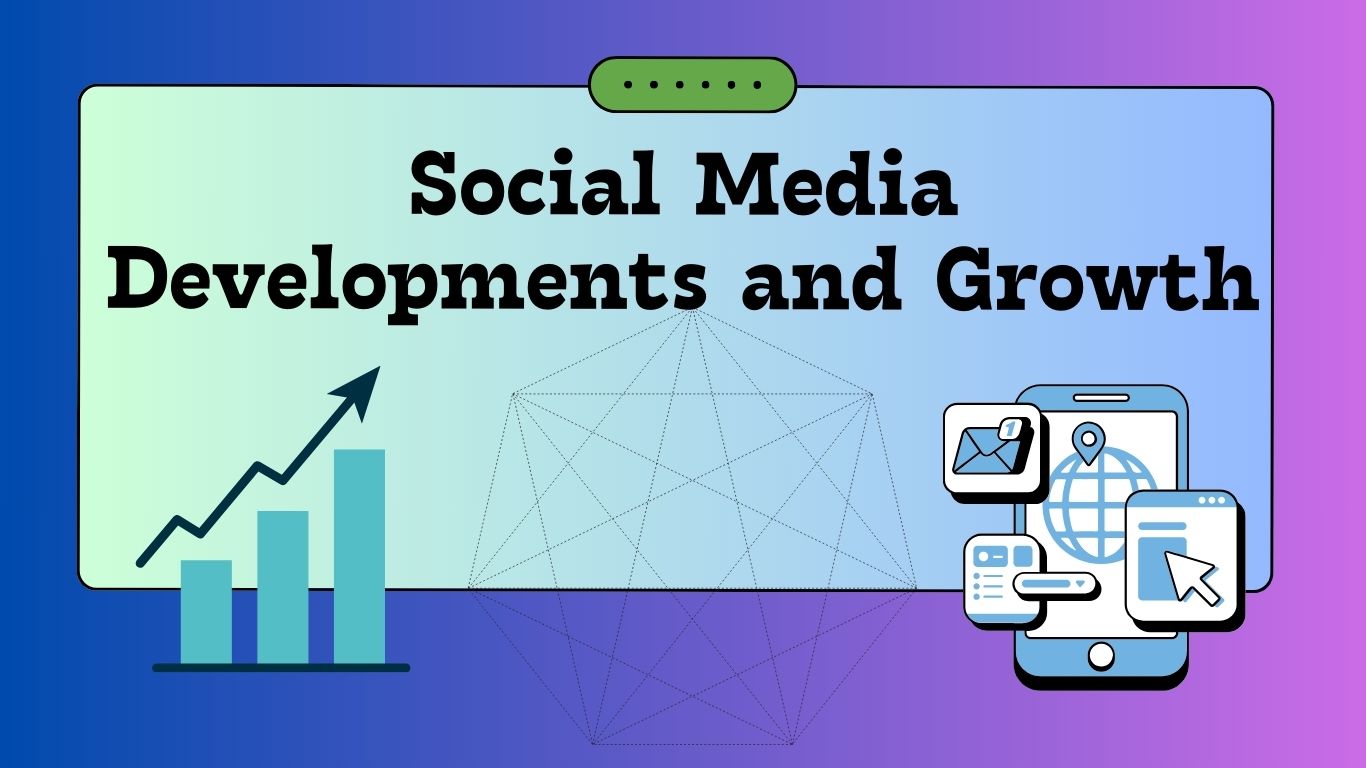Social Media Developments and Growth
Social media developments encompass the significant evolution of online platforms that facilitate user interaction, content sharing, and community engagement. Originating in the 1960s with rudimentary electronic communication, the landscape of social media has rapidly transformed, particularly since the launch of early sites like SixDegrees.com in 1997 and the explosive rise of platforms such as Facebook, Twitter, and Instagram in the 2000s and beyond. These advancements have reshaped how individuals connect, share information, and engage with various communities, highlighting social media’s crucial role in contemporary communication and culture.
The significance of social media is underscored by its vast user base, with billions engaging on platforms that cater to diverse interests—from professional networking on LinkedIn to visual storytelling on Instagram. Social media has not only revolutionized personal communication but has also emerged as a vital tool for activism and cultural expression, exemplified by movements such as #BlackLivesMatter and #MeToo that leverage these platforms to amplify marginalized voices and foster social change.
However, this growth has not come without controversies, including concerns over misinformation, mental health implications, and ethical issues related to data privacy and user safety, particularly following high-profile data breaches and instances of cyberbullying.
As social media continues to evolve, trends such as the integration of e-commerce features, mobile-first engagement strategies, and algorithmic content discovery shape user experiences and interactions. These developments also introduce challenges, including the potential for misinformation, cultural appropriation, and the mental health impacts associated with constant connectivity and curated online personas.
The ongoing debate surrounding regulation and ethical use of social media remains pertinent, as lawmakers and advocacy groups push for measures to protect users from exploitation and enhance data privacy.
In summary, the trajectory of social media development reflects a complex interplay between technological innovation and societal dynamics, influencing how we communicate, engage, and build communities in the digital age. Understanding this evolution is crucial for navigating the future of social media while addressing its inherent challenges and harnessing its potential for positive societal impact.
History of Social Media
The history of social media is a testament to the evolution of communication and technology, tracing its roots back to the early days of the internet. The journey began in the 1960s with primitive forms of electronic communication and bulletin board systems, paving the way for the emergence of more sophisticated platforms in subsequent decades.
Early Beginnings
In the 1980s, personal computers became more commonplace, which led to the growth of online communities. Internet Relay Chats (IRCs) were first used in 1988, allowing users to communicate in real-time. The first genuine social media site, SixDegrees.com, launched in 1997, enabled users to create profiles and connect with others, marking a significant shift in how individuals interacted online. It allowed for friend connections and message exchanges, influencing future platforms.
The Rise of Major Platforms
The early 2000s saw the introduction of several influential social media platforms. In 2003, MySpace emerged as a leader, offering extensive customization options for user profiles and the ability to share music and videos. MySpace became the most visited website by 2006, highlighting the growing importance of social networking in daily life. That same year, LinkedIn was launched, specifically targeting professional networking and career development, further diversifying the social media landscape.
The Social Media Explosion
In 2004, Facebook was launched, eventually surpassing MySpace in popularity by 2008. Its universal appeal and user-friendly interface revolutionized how people connected online, making it one of the most significant social media platforms in history. Other notable platforms, such as YouTube (launched in 2005) and Twitter (introduced in 2006), contributed to the diversification of social media by focusing on video sharing and microblogging, respectively.
The Modern Era
As the 2010s progressed, social media continued to evolve with the introduction of platforms like Instagram in 2010, which emphasized visual storytelling, and Snapchat in 2011, which focused on ephemeral content. This era also saw the rise of influencer marketing and the significance of video content, reflecting changes in user engagement and content consumption patterns. By 2020, the social media landscape had expanded to include platforms like TikTok, Reddit, and Pinterest, catering to a variety of interests and user preferences, illustrating the adaptability and ongoing relevance of social media in contemporary society.
Key Features of Social Media
User-Generated Content
A critical aspect of social media is the prominence of user-generated content. This form of content not only serves to inform others but also builds trust by showcasing products or services in real-world settings. The authenticity of user-generated content often resonates more deeply with audiences, creating a more relatable and genuine user experience. As a result, many brands are shifting their strategies to include a more human, people-first approach that prioritizes authentic engagement over robotic interactions.
Communication and Connectivity
Social media platforms are primarily designed to foster connections among users, allowing individuals to follow friends, family, influencers, or brands that interest them. This interconnectedness enables users to stay updated on loved ones, discover content tailored to their interests, and engage in discussions with like-minded individuals. The ability to communicate privately through direct messaging (DM) further enhances these connections, facilitating one-on-one conversations and group chats that can deepen relationships beyond public posts.
Engagement Mechanisms
Social media thrives on interaction, utilizing features such as likes and comments to gauge engagement. “Liking” content indicates approval, while comments enable users to share thoughts and spark conversations, fostering a sense of community. The volume of likes and comments serves as a metric of engagement, highlighting how well content resonates with audiences. Additionally, platforms are increasingly incorporating live video streams and digital retail functionalities, expanding the ways users can interact and engage with content and creators.
Diverse Platforms and Content Types
The variety of social media platforms allows for a range of content types and purposes. For instance, LinkedIn focuses on professional networking, while Instagram emphasizes image sharing. This diversity enables users to choose platforms that align with their specific interests, whether they seek business connections, entertainment, or social interaction. Furthermore, the evolution of social media continues to expand the definition of these platforms, as new mediums such as podcasts and live streaming gain popularity.
Impact on Mental Health
While social media fosters connectivity, it also poses challenges, particularly regarding mental health. Studies indicate that social media can contribute to issues like addiction, self-esteem problems, and feelings of social isolation. This duality highlights the importance of understanding the psychological effects of social media use.
Regulatory and Ethical Considerations
With the rise of social media, concerns over data privacy and security have become increasingly pertinent. High-profile incidents, such as the Google+ data breach, have sparked discussions regarding the ethical handling of user data by social media companies. As these platforms continue to evolve, the need for effective regulation and governance remains a crucial consideration in ensuring user safety and trust.
Impact on Society
Social media has significantly transformed the fabric of society, influencing how individuals connect, communicate, and engage with the world around them. This impact is multifaceted, affecting cultural expression, social activism, the dissemination of information, and interpersonal relationships.
Cultural Expression and Identity
Social media platforms have emerged as powerful vehicles for cultural expression and identity formation. Individuals and communities utilize these platforms to celebrate their cultural heritage, share artistic creations, and connect with like-minded individuals globally. The ability to showcase diverse cultures promotes cultural exchange and fosters cross-cultural understanding, making social media a pivotal space for cultural dialogue and appreciation.
Amplifying Activism and Social Causes
One of the most notable effects of social media is its role in amplifying social causes and driving activism. Movements such as #BlackLivesMatter, #MeToo, and #ClimateStrike have gained global traction through these platforms, mobilizing individuals and raising awareness about critical social issues. The use of hashtags, viral campaigns, and online petitions has been instrumental in creating social change, demonstrating the potential of social media as a tool for activism and collective action.
Challenges of Misinformation
Despite its positive contributions, social media also poses significant challenges, particularly in the realm of misinformation and fake news. The rapid spread of unverified information can influence cultural norms and societal behaviors negatively, leading to confusion and division. Additionally, social media’s role in shaping perceptions of body image and beauty standards raises concerns about mental health and societal pressures, necessitating the promotion of positive, inclusive content.
Empowering Marginalized Voices
Social media has played a crucial role in empowering marginalized voices and fostering inclusivity. Online activism and community-building efforts enable underrepresented communities to challenge systemic inequalities and advocate for social justice. The proliferation of online support networks and the use of hashtags further amplify these voices, creating spaces for dialogue and solidarity.
The Future of Social Media and Cultural Impact
Looking ahead, the future of social media presents both opportunities and challenges for societal evolution. As technology continues to advance, the impact of social media on culture and communication will likely grow, influencing the ways we perceive and interact with each other. Understanding these dynamics is essential for harnessing the potential of social media for positive societal change while mitigating its risks.
Trends and Innovations
Growth of Social Media Platforms
The landscape of social media is rapidly evolving, driven by technological advancements and changing consumer behaviors. As of 2024, social media platforms are increasingly integrating e-commerce features, allowing brands to build direct relationships with consumers and foster community engagement. This shift is evidenced by platforms such as Instagram, Facebook, and Pinterest, which provide seamless e-commerce integrations that facilitate shopping directly from social media feeds. The rise of social commerce is reshaping traditional marketing strategies, enabling brands to connect with global audiences in real-time and gather valuable insights into consumer preferences.
Mobile-First Revolution
The transition from desktop to mobile platforms has been a significant trend in social media usage. With the proliferation of smartphones, users now engage with social media applications on-the-go, leading to the development of mobile-first platforms. These platforms prioritize user experience, emphasizing simplicity, speed, and accessibility. For instance, applications like Snapchat and TikTok have gained popularity by offering unique, mobile-friendly content formats such as ephemeral messaging and short videos, which resonate with younger demographics. This mobile-centric approach has transformed not only how users interact with content but also how businesses engage with their customers, making social media an essential tool for small businesses.
Algorithmic Content Discovery
The evolution of algorithmic content discovery has also significantly impacted social media engagement. Modern algorithms curate personalized content feeds, showcasing a mix of posts tailored to individual user interests rather than presenting content chronologically. This shift has increased engagement rates but has also raised concerns over the creation of “filter bubbles,” where users are exposed primarily to information that reinforces their existing beliefs. As users become more aware of these dynamics, social media platforms are responding by enhancing transparency and user control over content visibility.
Privacy and Security Concerns
Despite the advancements and innovations within social media, privacy and data security remain pressing concerns for users. High-profile data breaches, such as the Cambridge Analytica incident involving Facebook, have heightened public awareness of the risks associated with sharing personal information online. In response to these concerns, social media platforms are collaborating with third-party payment solutions to create safer transaction environments and are implementing stricter data privacy measures. This proactive approach aims to restore user trust and facilitate the continued growth of the market.
Future Directions
Looking ahead, the future of social media is set for continued growth and innovation, particularly as technology continues to evolve. The integration of new features, such as augmented reality and advanced analytics, is expected to empower brands to create more engaging content and foster deeper connections with consumers. As social media platforms adapt to these changes, they will remain central to modern marketing strategies, offering dynamic opportunities for brands to engage with their audiences.
Challenges and Criticisms
Social media platforms have become integral to modern communication, but they also face significant challenges and criticisms that impact users and society at large.
Misinformation and Fake News
One of the most pressing issues associated with social media is the proliferation of misinformation and fake news. During the COVID-19 pandemic, platforms like Twitter and Facebook became major channels for the spread of false information regarding health and safety measures. This phenomenon, often referred to as an “infodemic,” has led to widespread panic, misinformed health decisions, and public distrust in legitimate sources of information. For instance, misinformation about the virus’s transmission and prevention spread rapidly, contributing to behaviors that could undermine public health efforts.
Cultural Appropriation and Sensitivity
Social media has also been criticized for facilitating cultural appropriation, where elements of a culture are taken and used outside of their original context, often without proper acknowledgment or respect. This has raised concerns about cultural sensitivity, as users may misrepresent or exploit cultural symbols and practices, leading to backlash from the affected communities. The complexities surrounding these issues necessitate a heightened awareness and understanding of cultural contexts when engaging with diverse communities online.
Mental Health Implications
Additionally, the impact of social media on mental health is a growing concern. While platforms can provide support and connection, they can also exacerbate feelings of loneliness, anxiety, and depression, particularly among young users. Reports indicate that many teens use social media to seek information about mental health, which can be both beneficial and detrimental, depending on the accuracy and context of the content consumed. The pressure to present a curated, idealized version of life can lead to detrimental comparisons and a decrease in self-esteem among users.
Regulation and User Privacy
As social media companies grapple with these challenges, there is ongoing debate over the need for regulation. Lawmakers and advocacy groups argue that existing privacy laws are inadequate to protect users from data misuse and exploitation, especially in the face of targeted advertising and algorithm-driven content distribution. Critics assert that without stricter regulations, social media platforms may continue to prioritize profit over user safety and ethical considerations, leading to further public disillusionment.
Engagement and Retention Issues
Finally, the retention of users has become a critical challenge for emerging platforms. For instance, while Threads initially gained a large user base, it faced a dramatic decline in daily active users shortly after launch. This decline underscores the difficulty of maintaining user engagement in an increasingly competitive landscape where users are bombarded with content from multiple sources.
Future of Social Media
The future of social media is marked by rapid change and innovation, influenced by technological advancements, shifting cultural dynamics, and evolving user behaviors. The COVID times significantly altered social media usage, resulting in increased screen time and heightened reliance on digital communication platforms. A survey indicated that 88% of marketers experienced positive returns on investment through video content, with many who previously did not utilize video expressing intentions to incorporate it in their strategies going forward. This trend highlights the growing importance of video in social media marketing and user engagement.
As we look ahead, questions arise about the longevity and relevance of existing platforms like Facebook, Instagram, and Twitter amidst the constant evolution of technology and user preferences. The landscape may see the emergence of new platforms or features that cater to changing needs, such as virtual reality or micro-blogging formats. Additionally, the balance between user engagement and the negative aspects of social media, such as misinformation and privacy concerns, will remain a critical area of discussion and regulation.
The adaptability and resilience of both individuals and communities will be crucial as social media continues to shape social interactions and cultural trends. Embracing new perspectives and understanding the implications of technological advancements can lead to a more inclusive and dynamic digital landscape. Future social media developments will likely focus on fostering community connections while addressing the challenges posed by the “dark side” of social media, including political manipulation and the proliferation of toxic interactions.










